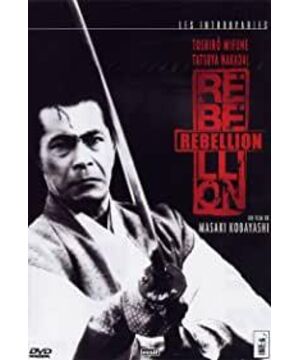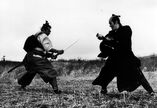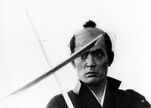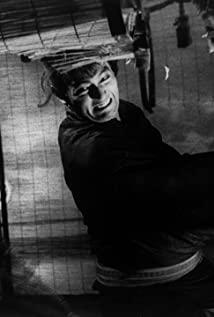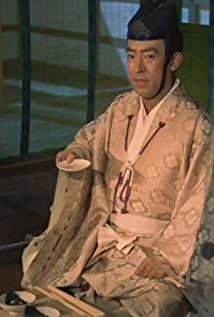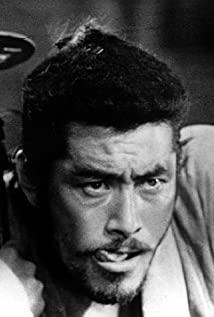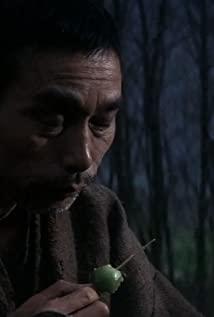I was amazed at "Cut the Belly", I remembered Kobayashi Masaki, this "Death Sword", on the basis of Kobayashi Masaki, Nakadai Tatsuya, and Hashimoto Shinobi, Mifune Toshiro was added. , it is better to meet than to be famous". Unlike Kurosawa Akira, Hashimoto Shinobi, Mifune Toshiro co-operated with "Intentional Stick" and "Tsubaki Sanjiro" and other films, the knight-like warrior image was created. Whether it is the old samurai played by Tatsuya Nakadai in the former, or Isaburo played by Toshiro Mifune in the latter, they are all samurai who are struggling in real life. The tragedy struck, for which they could only stand with their swords drawn. I happened to be watching "Chrysanthemum and the Sword" recently, and I have a little understanding of some social customs in Japan. Just like the beginning of "The Sword of Death", it is a tower and its partial close-up. In my opinion, the layers of the tower and the tiles symbolize the hierarchy of Japanese society and stand strictly. No matter at home or in the domain, everyone is in their own place, and a little overstepping is regarded as unfilial and disloyal. Even the loving Goro and Aichi still abide by the rules at home and do not dare to disobey their parents. It is conceivable that Isaburo, who is in the marriage, has endured silently for more than 20 years. I can't help it, I am willing to do everything I can to help them, and I can really do what I want to do. The Japanese are very particular about loyalty and filial piety. Parents can always dictate to their children and superiors to subordinates to make them obey their promises. Therefore, Goro Aichi's love faces more and more pressure than Luo Zhu. For Goro, he was unfilial to his mother, unfriendly to his younger brother, unfaithful to his master, and unjust to his relatives. For Aichi, the abandonment of her fiance and her father, her resentment towards the feudal lord and her anger towards her new lover, her love for her children and her gratitude and love for her father-in-law and her husband made it even more important, and her female consciousness gradually awakened. Persistently pursue his own happiness, and sacrifice himself in the face of the predicament set by the vassal side. More importantly, in addition to these pressures, Isaburo, Goro, and Aichi's greater resistance is a resistance to the hierarchy, because as said in "Chrysanthemum and the Sword", according to Japanese customs, even if the higher-ups demand It is too unethical and can only be endured, so their resistance is not only the resistance of the feudal lord to the family and relatives, but more importantly, the awakening of humanistic consciousness, the resistance to tradition and habit, similar to the Confucian "benevolence". ", more self-awareness and sense of resistance, the so-called "monarch treats ministers like grass mustards, ministers treat the king like thieves and enemies". Some of the design of the film is very interesting. When things started, it was a festival, and there was the sound of drums, as if to herald the start of the battle, and the festival two years later was the sound of drums again, this time it was the prelude to the battle. subject to grade Influenced by the idea of controlling each other's position, the border policeman played by Nakadai Tatsuya dared to refuse the lord on the spot, and would rather die than his friends. The design of breastfeeding peasant women gives hope that Xiaofu, who represents the future, will be arranged after his grandfather's death in battle. Before the night battle, Ashi sacrificed himself, and Goro couldn't help picking him up, so he was attacked to death, so that Toshiro Mifune fought the crowd alone and completed a wonderful one-to-many martial arts drama, which reminded me of Tatsuya Nakadai in "Cut the Belly". Also singles out the crowd. The tilted shot of Isaburo holding his sword tremblingly after being shot highlights Isaburo's unwillingness and the injustice of reality. The gunpowder gun against the samurai sword reminds me of Kurosawa Akira's "Ran". In addition, in the duel between Toshiro Mifune and Tatsuya Nakadai, the latter always loses. Toshiro Mifune has the halo of the protagonist, and Tatsuya Nakadai was cut with blood in "Tsubaki Sanjiro".
View more about Samurai Rebellion reviews


